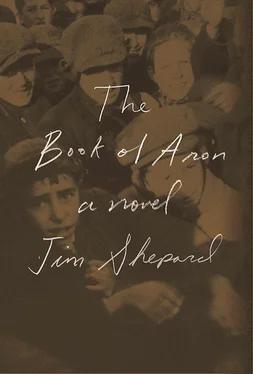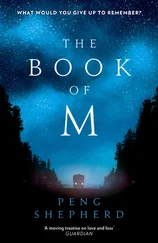She stayed sick and the weather stayed windy and sleeting. The Hanukkah decorations fell over in the drafts from the door. She had more trouble breathing. Sometimes I slept under her cot but they found me and drove me downstairs so then I slept near the front doors under the portrait of the hospital’s founder.
“You’re like me,” she said one night after her breathing got so bad it woke us up. “You think if you stay quiet you’ll be able to keep going like everyone else.” She sounded so bad I found a nurse who brought her some beet marmalade and a glass of undiluted spirits.
The spirits made her cheeks red. She raised her eyebrows after a few sips as if she’d been given a treat. She asked if I wanted any. I told her that the first glassful was for her. She nodded. By then she was having such trouble breathing it sounded like she was whinnying.
She asked if I was sorry to have to go on without her. She asked if I thought I could do it. I looked into her face and wondered if she was really going to leave me. The thought made me so mad that I told her I could do anything and she set the glass of spirits on the floor and tried to sit up and I couldn’t tell from her expression how bad she felt or if this made it any better.
She said the light hurt her eyes so I went down the hall and switched it off. Some of the patients on the cots and the nurse sitting at the end of the hallway with her paperwork complained, but in the dark I could see my family again, my father in his white holiday shirt and my mother and my brothers and even my younger brother, all of their faces at that point blind to what was coming.
On my walk home the streets were very bad and icy. I slipped and fell more than once. It was after curfew but there was no moon and no one wanted to be out in the cold so no one saw me. I walked like I was part of my own funeral procession. At home I let myself in and stopped, as if there was nothing for me to do and nowhere for me to go in the face of the pictures in my head.
I WOKE ON MY MOTHER’S BLANKET TO THE SHRIEK OF a window wrenched open and in the kitchen Boris was throwing my clothes into the street. There’d been a knock on the door and he’d answered it but I hadn’t bothered to see who it was.
I stood in my nightshirt, blinking, my feet cold on the floor. His mother and sister were also in the doorway to their room.
“Leave him alone,” his sister said when she saw me. “His mother just died.”
“And now we’re quarantined,” Boris shouted. I thought he was about to kill me, like somebody might cross a street. “Do you know how much I’m going to have to pay to keep us out of that hospital?”
“That’s not his fault,” his sister said.
“How did they know where to find you and Lutek?” he asked me. “They were there waiting, before you were. I saw them.”
I stood at the sink and rubbed my eyes with the back of my hand. I couldn’t work out how to get the water going. “Maybe they got lucky,” his sister said.
“They weren’t even keeping watch,” he told her. “And when I asked you where he was then, you said you didn’t know,” he said to me.
He waited for me to answer.
“You just woke him up,” his sister said.
“Well?” he said.
“Sh’maya thinks only of himself,” I told him.
He looked at me. “If it had been my turn to go with you, it would have been me,” he said.
His sister told him she didn’t understand, so he explained it to her. I was an informer. I worked for the Gestapo. His sister backed up a step and looked at me like I had two heads.
“Won’t he tell the Germans if you throw him out?” she asked.
“No,” he told her, looking at me.
I dressed on the street in the snow. People passing by didn’t seem to find it strange. I pulled the sweater my mother had boiled over three of my shirts. My socks were soaked when I put on my shoes but they warmed up after a while.
There was nowhere to go. I spent the day walking around.
When curfew came I climbed down a covered cellarway and moved a trash bin to block the wind but still got so cold I had to move.
I made it to Adina’s building after hiding every few minutes because of the patrols. I knocked on her window and at first she wouldn’t open the shade and then she wouldn’t let me in. Finally, when I stood on the street and called her name, she opened the window a crack and tossed out some bread.
“Are you crazy?” she said. “Do you want to get me killed too?”
“I’m sorry,” I told her.
“This is all I have,” she said about the bread and then told me not to come back again and sent me away sobbing and eating it.
Toward the end of the night I found the block where Boris had ambushed the kid from the other gang and crawled down under the rubble into the caved-in cellar. I felt around in the dark for a place I could lie down. The kid he’d hit with the brick was gone. I stayed there and stole from street vendors or smaller kids when I got too hungry. I was a thief that janitors and porters chased away from their doorways with sweeps of their brooms. I drank snowmelt collected in a can. I lay for days under some blankets. When I went out for food starving people slipped out of dark corners and followed me and when one beggar got hold of something the rest of the pack knocked him down and ripped what he had from his hands and then others stole it from them. Once whatever it was was eaten, everyone went back to begging.
I tried to make myself invisible but kids who had nowhere to go were everywhere and the smaller ones trailed anyone who might have a better situation. I ran away from them but three or four found my cellar and told their friends.
After that I wandered without a plan. I was always without a plan. I slept between the chairs on an old orchestra stand.
It got colder. A woman on the street felt bad when she saw me and gave me an extra pair of stockings to go over my socks but the elastics were broken. I helped another woman carry a milk canister and when we got to her place she gave me an extra coat.
I stole some cooked potatoes and when I finally stopped running and thought I was safe I walked right into Lutek’s sister.
“My God, how you look!” she said. She burst into tears and asked what had happened to her brother. She still had her stutter. She kicked at me and when a yellow policeman came over her friend dragged her away. I found myself on my hands and knees in the slush. The policeman stood over me and nudged me with his foot. Then he left. While I was weeping someone stole the potatoes I had taken.
It warmed up a little so my feet and hands got better. I lost track of the days. I passed a clinic that treated eye infections and started going inside. I let everyone in line get ahead of me so I could sit in the warm waiting room for a few hours. I found one of the buildings where they’d restarted a grammar school and slipped in and took a seat in the back. The teacher noticed but seemed to know why I was there and didn’t throw me out. Then through the window I saw Lutek’s father pass by outside and I never went back.
Near the hospital where my mother died I saw Lejkin and some other police stop someone and hid until they were gone.
I wandered the streets. I spent nights wedged into crannies like a spider. I gave up on thinking ahead. I walked back and forth.
A boy my age caught me trying to steal from his father’s shop while he was watching it and knocked me down with a club he had behind the counter and while I sat there crying and rubbing my head he tied my wrists with a rope and then tied the rope to a cart he had outside. He hefted the cart’s handles and started dragging me. I slipped and stumbled trying to free myself. He was talking about how tired he was of this and how he was going to take me to the Germans himself. But he tied the knot too loose and by scraping it against the back of the cart I got it free. He still didn’t know, dragging his cart along, and the street he turned us onto was empty. I looked at the back of his head. Somewhere he had a mother hoping he’d come home safe. I could take him from her like my mother was taken from me. But instead when I passed an alley I dropped the rope and ran.
Читать дальше












